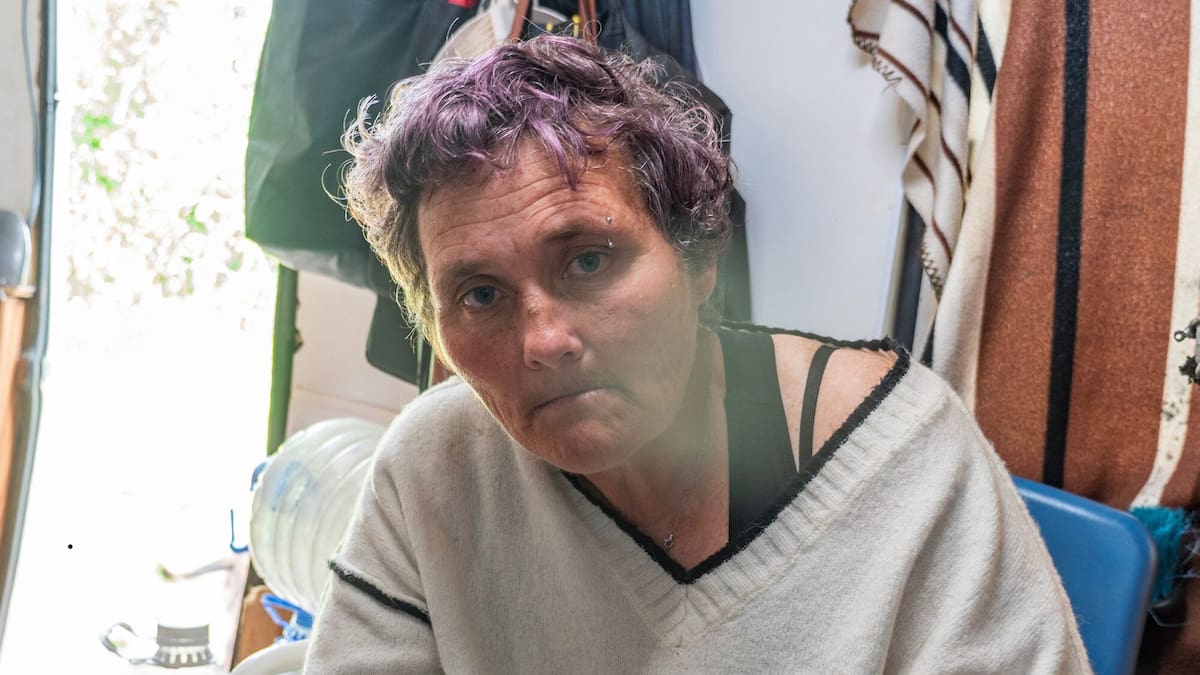She cannot live at his place as he lives in a men’s-only shelter.
On other days, she washes at the local swimming pool or swims in the river. For a toilet, she relies on a commode inside the van, which she empties at her partner’s place.
Before the campervan, Smith lived in a Melville housing complex. She said she left because emergency services struggled to find the location, and she feared what might happen.
“It wasn’t safe.”
Now, the campervan moves every few days to avoid parking breaches, often returning to Edgecumbe St, where a local pensioner had tried to help.
The man, who did not want to be named, offered home-cooked meals and access to a bathroom, but said he had to stop when costs became too much.
Smith said her disability allowance of $350 a week barely stretched.
Two nights in a motel would cost $250, leaving little for food or essentials.
Her supporter even wrote to MPs about her situation, but said there was no response.
Her struggle is far from unique. Though Ministry of Social Development figures show emergency motel use in Hamilton fell from 507 households in December 2023 to 144 by November last year.
The number of children in those motels dropped from 516 to 165.
Yet the People’s Project, which runs Hamilton’s Housing First programme, counted about 34 people sleeping rough in 2023 – some in cars or vans.
On average, 152 Hamilton households accessed emergency housing grants each quarter in the year to June 2025.
Smith is on the social housing waitlist but has yet to be placed in a suitable property.
For now, she continues shifting the campervan every few days and relying heavily on her partner.
Goodwill has limits
Waikato community psychologist Dr Rebekah Graham said the system worked against people like Smith.
“It’s a massive, yawning gap. Without close friends or family to support them, there is often very little assistance available.”
Graham, who has researched poverty, health, food insecurity and disability, said government funding often fell short.
“It subsidises, but it’s not enough. There’s an expectation – even in allocation tools – that natural and community supports will fill the gaps.”
She said $350 a week was insufficient, and emergency housing came at a cost.
For Smith, living with her three dogs was vital to her sense of self and safety.
“There is also an element of protection if you are on your own as a disabled woman,” Graham said.
Yet relying on goodwill had limits.
“People say, ‘I’m sorry, I cannot help anymore’,” she said.
There are solutions.
Graham said the Government could cap private rentals to make them more affordable and expand disability-accessible housing.
Housing Minister Tama Potaka. Photo / Mark Mitchell
Too many people
Housing Minister Tama Potaka said Smith’s situation highlighted the urgent need for homes suitable for people with disabilities.
“It’s concerning to hear of anyone living in this situation. There is absolutely a need for more homes better suited for those with disabilities.”
The Government was boosting supply by reforming planning laws, funding social housing, and supporting providers with expertise in disability housing, such as Accessible Properties.
Potaka said around half of the people on the social housing waitlist needed one-bedroom homes, but only 12% of Kāinga Ora’s stock met that need.
“Too many people have been waiting too long for the right kind of home,” he said.
For now, Smith remains in her campervan, moving it every few days and relying on her partner’s support.
Tom Eley is a multimedia journalist at the Waikato Herald. He previously worked for the Weekend Sun and Sunlive.

